- Home
- Roald Dahl
The Best of Roald Dahl Page 34
The Best of Roald Dahl Read online
Page 34
There were six other people ahead of him in the waiting-room. There was a fat mother with her two little boys aged about nine and eleven. There was a bright-eyed young couple who looked as though they might be on their honeymoon. And there was a pale woman with long white gloves, who sat very upright, looking straight ahead with her hands folded on her lap. Nobody spoke. Lexington wondered whether they were all writing cooking-books, like himself, but when he put this question to them aloud, he got no answer. The grown-ups merely smiled mysteriously to themselves and shook their heads, and the two children stared at him as though they were seeing a lunatic.
Soon, the door opened and a man with a merry pink face popped his head into the room and said, 'Next, please.' The mother and the two boys got up and went out.
About ten minutes later, the same man returned. 'Next, please,' he said again, and the honeymoon couple jumped up and followed him outside.
Two new visitors came in and sat down - a middle-aged husband and a middle-aged wife, the wife carrying a wicker shopping-basket containing groceries.
'Next, please,' said the guide, and the woman with the long white gloves got up and left.
Several more people came in and took their places on the stiff-backed wooden chairs.
Soon the guide returned for the third time, and now it was Lexington's turn to go outside.
'Follow me, please,' the guide said, leading the youth across the yard towards the main building.
'How exciting this is!' Lexington cried, hopping from one foot to the other. 'I only wish that my dear Aunt Glosspan could be with me now to see what I am going to see.'
'I myself only do the preliminaries,' the guide said. 'Then I shall hand you over to someone else.'
'Anything you say,' cried the ecstatic youth.
First they visited a large penned-in area at the back of the building where several hundred pigs were wandering around. 'Here's where they start,' the guide said. 'And over there's where they go in.'
'Where?'
'Right there.' The guide pointed to a long wooden shed that stood against the outside wall of the factory. 'We call it the shackling-pen. This way, please.'
Three men wearing long rubber boots were driving a dozen pigs into the shackling-pen just as Lexington and the guide approached, so they all went in together.
'Now,' the guide said, 'watch how they shackle them.'
Inside, the shed was simply a bare wooden room with no roof, but there was a steel cable with hooks on it that kept moving slowly along the length of one wall, parallel with the ground, about three feet up. When it reached the end of the shed, this cable suddenly changed direction and climbed vertically upward through the open roof towards the top floor of the main building.
The twelve pigs were huddled together at the far end of the pen, standing quietly, looking apprehensive. One of the men in rubber boots pulled a length of metal chain down from the wall and advanced upon the nearest animal, approaching it from the rear. Then he bent down and quickly looped one end of the chain around one of the animal's hind legs. The other end he attached to a hook on the moving cable as it went by. The cable kept moving. The chain tightened. The pig's leg was pulled up and back, and then the pig itself began to be dragged backwards. But it didn't fall down. It was rather a nimble pig, and somehow it managed to keep its balance on three legs, hopping from foot to foot and struggling against the pull of the chain, but going back and back all the time until at the end of the pen where the cable changed direction and went vertically upwards, the creature was suddenly jerked off its feet and borne aloft. Shrill protests filled the air.
'Truly a fascinating process,' Lexington said. 'But what was that funny cracking noise it made as it went up?'
'Probably the leg,' the guide answered. 'Either that or the pelvis.'
'But doesn't that matter?'
'Why should it matter?' the guide asked. 'You don't eat the bones.'
The rubber-booted men were busy shackling the rest of the pigs, and one after another they were hooked to the moving cable and hoisted up through the roof, protesting loudly as they went.
'There's a good deal more to this recipe than just picking herbs,' Lexington said. 'Aunt Glosspan would never have made it'
At this point, while Lexington was gazing skyward at the last pig to go up, a man in rubber boots approached him quietly from behind and looped one end of a chain round the youth's own left ankle, hooking the other end to the moving belt. The next moment, before he had time to realize what was happening, our hero was jerked off his feet and dragged backwards along the concrete floor of the shackling-pen.
'Stop!' he cried. 'Hold everything! My leg is caught!'
But nobody seemed to hear him, and five seconds later, the unhappy young man was jerked off the floor and hoisted vertically upwards through the open roof of the pen, dangling upside down by one ankle, and wriggling like a fish.
'Help!' he shouted. 'Help! There's been a frightful mistake! Stop the engines! Let me down!'
The guide removed a cigar from his mouth and looked up serenely at the rapidly ascending youth, but he said nothing. The men in rubber boots were already on their way out to collect the next batch of pigs.
'Oh save me!' our hero cried. 'Let me down! Please let me down!' But he was now approaching the top floor of the building where the moving belt curled over like a snake and entered a large hole in the wall, a kind of doorway without a door; and there, on the threshold, waiting to greet him, clothed in a dark-stained yellow rubber apron, and looking for all the world like Saint Peter at the Gates of Heaven, the sticker stood.
Lexington saw him only from upside down, and very briefly at that, but even so he noticed at once the expression of absolute peace and benevolence on the man's face, the cheerful twinkle in the eyes, the little wistful smile, and the dimples in his cheeks - and all this gave him hope.
'Hi there,' the sticker said, smiling.
'Quick! Save me!' our hero cried.
'With pleasure,' the sticker said, and taking Lexington gently by one ear with his left hand, he raised his right hand and deftly slit open the boy's jugular vein with a knife.
The belt moved on. Lexington went with it. Everything was still upside down and the blood was pouring out of his throat and getting into his eyes, but he could still see after a fashion, and he had a blurred impression of being in an enormously long room, and at the far end of the room there was a great smoking cauldron of water, and there were dark figures, half hidden in the steam, dancing round the edge of it, brandishing long poles. The conveyor-belt seemed to be travelling right over the top of the cauldron, and the pigs seemed to be dropping down one by one into the boiling water, and one of the pigs seemed to be wearing long white gloves on its front feet.
Suddenly our hero started to feel very sleepy, but it wasn't until his good strong heart had pumped the last drop of blood from his body that he passed on out of this, the best of all possible worlds, into the next.
The Visitor
[1965]
Not long ago, a large wooden case was deposited at the door of my house by the railway delivery service. It was an unusually strong and well-constructed object, and made of some kind of dark red hardwood, not unlike mahogany. I lifted it with great difficulty on to a table in the garden, and examined it carefully. The stencilling on one side said that it had been shipped from Haifa by the m/v Waverley Star, but I could find no sender's name or address. I tried to think of somebody living in Haifa or thereabouts who might be wanting to send me a magnificent present. I could think of no one. I walked slowly to the toolshed, still pondering the matter deeply, and returned with a hammer and screwdriver. Then I began gently to prise open the top of the case.
Behold, it was filled with books! Extraordinary books! One by one, I lifted them all out (not yet looking inside any of them) and stacked them in three tall piles on the table. There were twenty-eight volumes altogether, and very beautiful they were indeed. Each of them was identically and superbly bound i
n rich green morocco, with the initials O.H.C. and a Roman numeral (I to XXVIII) tooled in gold upon the spine.
I took up the nearest volume, number XVI, and opened it. The unlined white pages were filled with a neat small handwriting in black ink. On the title page was written '1934'. Nothing else. I took up another volume, number XXI. It contained more manuscript in the same handwriting, but on the title page it said '1939'. I put it down and pulled out Vol. I, hoping to find a preface of some kind there, or perhaps the author's name. Instead, I found an envelope inside the cover. The envelope was addressed to me. I took out the letter it contained and glanced quickly at the signature. 'Oswald Hendryks Cornelius', it said.
It was Uncle Oswald!
No member of the family had heard from Uncle Oswald for over thirty years. The letter was dated 10 March 1964, and until its arrival, we could only assume that he still existed. Nothing was really known about him except that he lived in France, that he travelled a great deal, that he was a wealthy bachelor with unsavoury but glamorous habits who steadfastly refused to have anything to do with his own relatives. The rest was all rumour and hearsay, but the rumours were so splendid and the hearsay so exotic that Oswald had long since become a shining hero and a legend to us all.
'My dear boy,' the letter began
I believe that you and your three sisters are my closest surviving blood relations. You are therefore my rightful heirs, and because I have made no will, all that I leave behind me when I die will be yours. Alas, I have nothing to leave. I used to have quite a lot, and the fact that I have recently disposed of it all in my own way is none of your business. As consolation, though, I am sending you my private diaries. These, I think, ought to remain in the family. They cover all the best years of my life, and it will do you no harm to read them. But if you show them around or lend them out to strangers, you do so at your own great peril. If you publish them, then that, I should imagine, would be the end of both you and your publisher simultaneously. For you must understand that thousands of the heroines whom I mention in the diaries are still only half dead, and if you were foolish enough to splash their lily-white reputations with scarlet print, they would have your head on a salver in two seconds flat, and probably roast it in the oven for good measure. So you'd better be careful. I only met you once. That was years ago, in 1921. when your family was living in that large ugly house in South Wales. I was your big uncle and you were a very small boy, about five years old. I don't suppose you remember the young Norwegian nursemaid you had then. A remarkably clean, well-built girl she was, and exquisitely shaped even in her uniform with its ridiculous starchy white shield concealing her lovely bosom. The afternoon I was there, she was taking you for a walk in the woods to pick bluebells, and I asked if I might come along. And when we got well into the middle of the woods, I told you I'd give you a bar of chocolate if you could find your own way home. And you did (see Vol. III). You were a sensible child. Farewell - Oswald Hendryks Cornelius.
The sudden arrival of the diaries caused much excitement in the family, and there was a rush to read them. We were not disappointed. It was astonishing stuff - hiliarious, witty, exciting, and often quite touching as well. The man's vitality was unbelievable. He was always on the move, from city to city, from country to country, from woman to woman, and in between the women, he would be searching for spiders in Kashmir or tracking down a blue porcelain vase in Nanking. But the women always came first. Wherever he went, he left an endless trail of females in his wake, females ruffled and ravished beyond words, but purring like cats.
Twenty-eight volumes with exactly three hundred pages to each volume take a deal of reading, and there are precious few writers who could hold an audience over a distance like that. But Oswald did it. The narrative never seemed to lose its flavour, the pace seldom slackened, and almost without exception, every single entry, whether it was long or short, and whatever the subject, became a marvellous little individual story that was complete in itself. And at the end of it all, when the last page of the last volume had been read, one was left with the rather breathless feeling that this might just possibly be one of the major autobiographical works of our time.
If it were regarded solely as a chronicle of a man's amorous adventures, then without a doubt there was nothing to touch it. Casanova's Memoirs read like a parish magazine in comparison, and the famous lover himself, beside Oswald, appears positively undersexed.
There was social dynamite on every page; Oswald was right about that. But he was surely wrong in thinking that the explosions would all come from the women. What about their husbands, the humiliated cock-sparrows, the cuckolds? The cuckold, when aroused, is a very fierce bird indeed, and there would be thousands upon thousands of them rising up out of the bushes if The Cornelius Diaries, unabridged, saw the light of day while they were still alive. Publication, therefore, was right out of the question.
A pity, this. Such a pity, in fact, that I thought something ought to be done about it. So I sat down and reread the diaries from beginning to end in the hope that I might discover at least one complete passage which could be printed and published without involving both the publisher and myself in serious litigation. To my joy, I found no less than six. I showed them to a lawyer. He said he thought they might be 'safe', but he wouldn't guarantee it. One of them - 'The Sinai Desert Episode' - seemed 'safer' than the other five, he added.
So I have decided to start with that one and to offer it for publication right away, at the end of this short preface. If it is accepted and all goes well, then perhaps I shall release one or two more.
The Sinai entry is from the last volume of all. Vol. XXVIII, and is dated 24 August 1946. In point of fact, it is the very last entry of the last volume of all, the last thing Oswald ever wrote, and we have no record of where he went or what he did after that date. One can only guess. You shall have the entry verbatim in a moment, but first of all, and so that you may more easily understand some of the things Oswald says and does in his story, let me try to tell you a little about the man himself. Out of the mass of confession and opinion contained in those twenty-eight volumes, there emerges a fairly clear picture of his character.
At the time of the Sinai episode, Oswald Hendryks Cornelius was fifty-one years old, and he had, of course, never been married. 'I am afraid,' he was in the habit of saying, 'that I have been blessed, or should I call it burdened, with an uncommonly fastidious nature.'
In some ways, this was true, but in others, and especially in so far as marriage was concerned, the statement was the exact opposite of the truth.
The real reason Oswald had refused to get married was simply that he had never in his life been able to confine his attentions to one particular woman for longer than the time it took to conquer her. When that was done, he lost interest and looked around for another victim.
A normal man would hardly consider this a valid reason for remaining single, but Oswald was not a normal man. He was not even a normally polygamous man. He was, to be honest, such a wanton and incorrigible philanderer that no bride on earth would have put up with him for more than a few days, let alone for the duration of a honeymoon - although heaven knows there were enough who would have been willing to give it a try.
He was a tall, narrow person with a fragile and faintly aesthetic air. His voice was soft, his manner was courteous, and at first sight he seemed more like a gentleman-in-waiting to the Queen than a celebrated rapscallion. He never discussed his amorous affairs with other men, and a stranger, though he might sit and talk with him all evening, would be unable to observe the slightest sign of deceit in Oswald's clear blue eyes. He was, in fact, precisely the sort of man that an anxious father would be likely to choose to escort his daughter safely home.
But sit Oswald beside a woman, a woman who interested him, and instantaneously his eyes would change, and as he looked at her, a small dangerous spark would begin dancing slowly in the very centre of each pupil; and then he would set about her with his conversation, talking to
her rapidly and cleverly and almost certainly more wittily than anyone else had ever done before. This was a gift he had, a most singular talent, and when he put his mind to it, he could make his words coil themselves round and round the listener until they held her in some sort of a mild hypnotic spell.
But it wasn't only his fine talk and the look in his eyes that fascinated the women. It was also his nose. (In Vol. XIV, Oswald includes, with obvious relish, a note written to him by a certain lady in which she describes such things as this in great detail.) It appears that when Oswald was aroused, something odd would begin to happen around the edges of his nostrils, a tightening of the rims, a visible flaring which enlarged the nostril holes and revealed whole areas of the bright red skin inside. This created a queer, wild, animalistic impression, and although it may not sound particularly attractive when described on paper, its effect upon the ladies was electric.
Almost without exception, women were drawn towards Oswald. In the first place, he was a man who refused to be owned at any price, and this automatically made him desirable. Add to this the unusual combination of a first-rate intellect, an abundance of charm, and a reputation for excessive promiscuity, and you have a potent recipe.
Then again, and forgetting for a moment the disreputable and licentious angle, it should be noted that there were a number of other surprising facets to Oswald's character that in themselves made him a rather intriguing person. There was, for example, very little that he did not know about nineteenth-century Italian opera, and he had written a curious little manual upon the three composers Donizetti, Verdi, and Ponchielli. In it, he listed by name all the important mistresses that these men had had during their lives, and he went on to examine, in a most serious vein, the relationship between creative passion and carnal passion, and the influence of the one upon the other, particularly as it affected the works of these composers.
Chinese porcelain was another of Oswald's interests, and he was acknowledged as something of an international authority in this field. The blue vases of the Tchin-Hoa period were his special love, and he had a small but exquisite collection of these pieces.

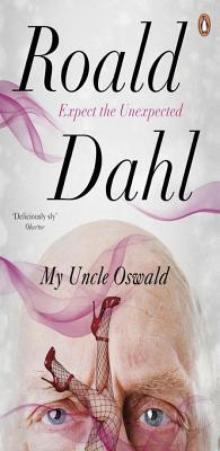 My Uncle Oswald
My Uncle Oswald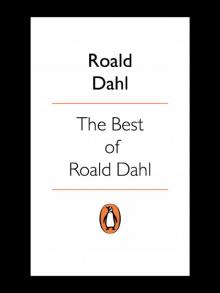 The Best of Roald Dahl
The Best of Roald Dahl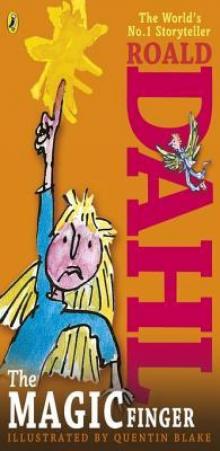 The Magic Finger
The Magic Finger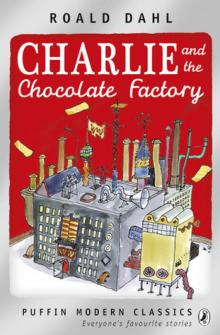 Charlie and the Chocolate Factory
Charlie and the Chocolate Factory Fantastic Mr Fox
Fantastic Mr Fox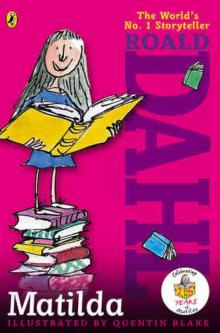 Matilda
Matilda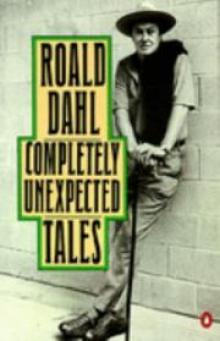 Completely Unexpected Tales: Tales of the Unexpected. More Tales of the Unexpected
Completely Unexpected Tales: Tales of the Unexpected. More Tales of the Unexpected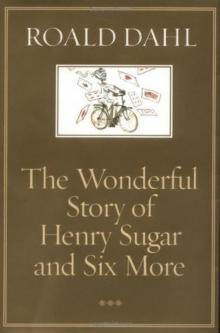 The Wonderful Story of Henry Sugar and Six More
The Wonderful Story of Henry Sugar and Six More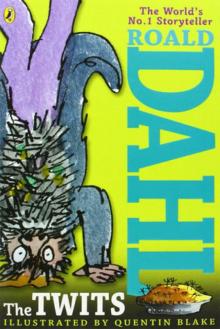 The Twits
The Twits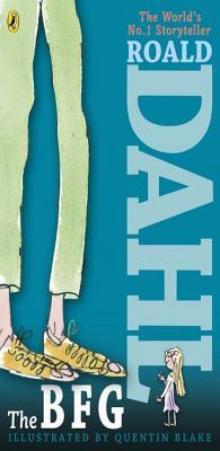 The BFG
The BFG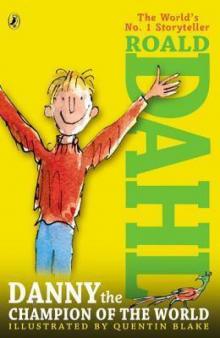 Danny the Champion of the World
Danny the Champion of the World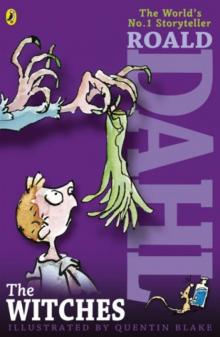 The Witches
The Witches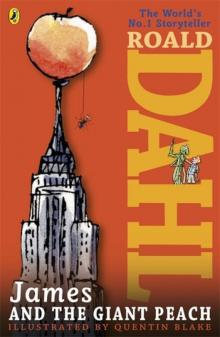 James and the Giant Peach
James and the Giant Peach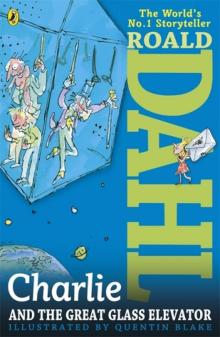 Charlie and the Great Glass Elevator
Charlie and the Great Glass Elevator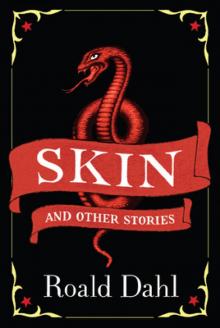 Skin and Other Stories
Skin and Other Stories Kiss Kiss
Kiss Kiss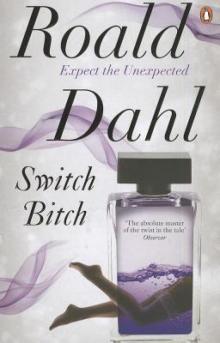 Switch Bitch
Switch Bitch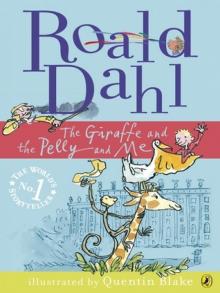 The Giraffe and the Pelly and Me
The Giraffe and the Pelly and Me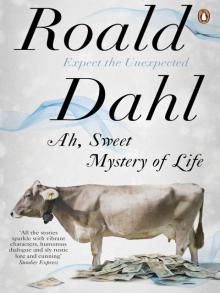 Ah, Sweet Mystery of Life
Ah, Sweet Mystery of Life Fear
Fear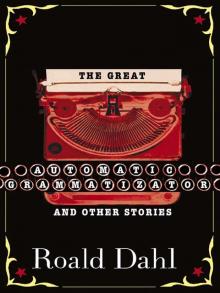 The Great Automatic Grammatizator and Other Stories
The Great Automatic Grammatizator and Other Stories Someone Like You
Someone Like You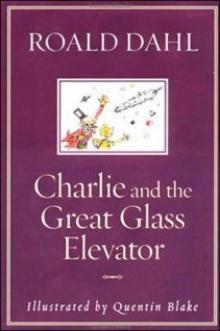 Charlie and the Great Glass Elevator c-2
Charlie and the Great Glass Elevator c-2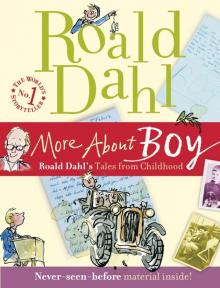 More About Boy
More About Boy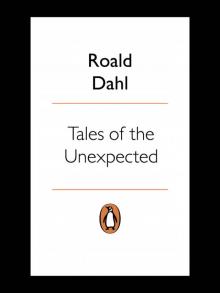 Tales of the Unexpected
Tales of the Unexpected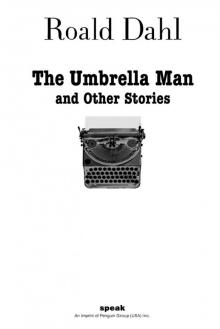 The Umbrella Man and Other Stories
The Umbrella Man and Other Stories Dirty Beasts
Dirty Beasts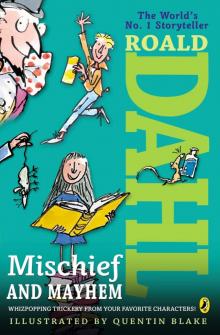 Roald Dahl's Mischief and Mayhem
Roald Dahl's Mischief and Mayhem The Collected Short Stories of Roald Dahl, Volume 1
The Collected Short Stories of Roald Dahl, Volume 1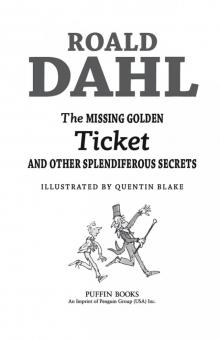 The Missing Golden Ticket and Other Splendiferous Secrets
The Missing Golden Ticket and Other Splendiferous Secrets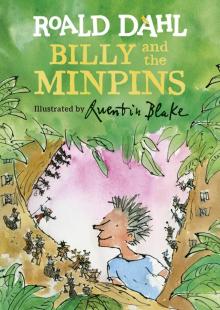 Billy and the Minpins
Billy and the Minpins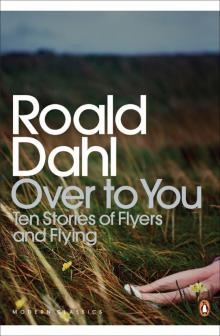 Over to You
Over to You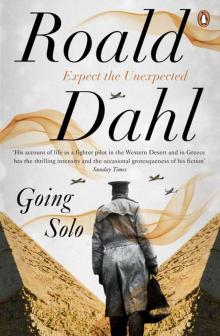 Going Solo
Going Solo Deception
Deception War
War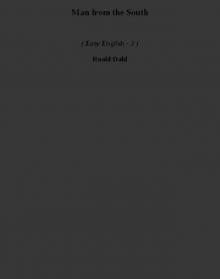 Man from the South ee-3
Man from the South ee-3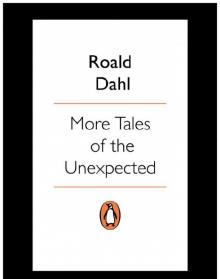 More Tales of the Unexpected
More Tales of the Unexpected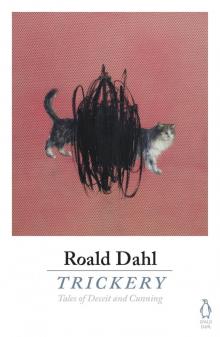 Trickery
Trickery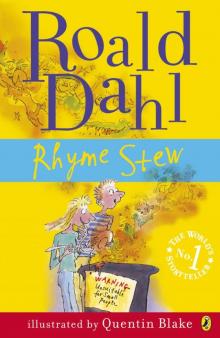 Rhyme Stew
Rhyme Stew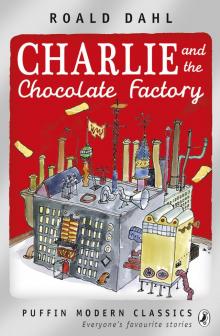 Charlie and the Chocolate Factory (Puffin Modern Classics relaunch)
Charlie and the Chocolate Factory (Puffin Modern Classics relaunch)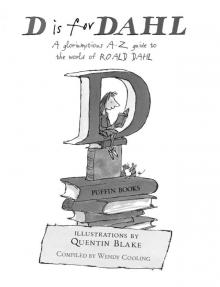 D is for Dahl
D is for Dahl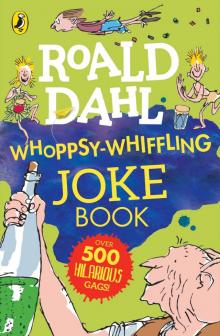 Roald Dahl Whoppsy-Whiffling Joke Book
Roald Dahl Whoppsy-Whiffling Joke Book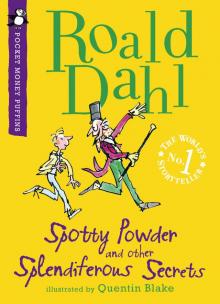 Spotty Powder and other Splendiferous Secrets
Spotty Powder and other Splendiferous Secrets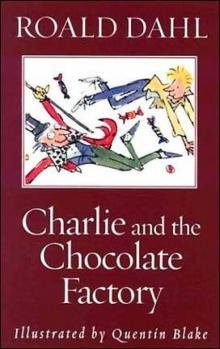 Charlie and the Chocolate Factory c-1
Charlie and the Chocolate Factory c-1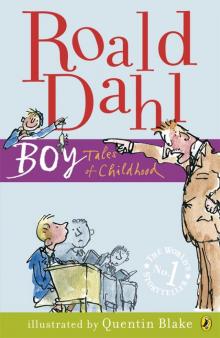 Boy
Boy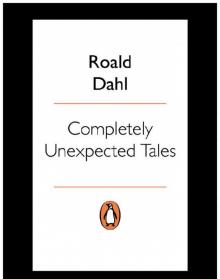 Completely Unexpected Tales
Completely Unexpected Tales Madness
Madness Innocence
Innocence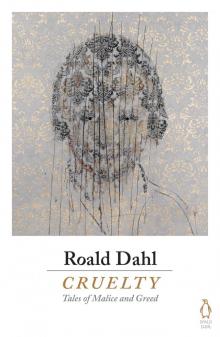 Cruelty
Cruelty George's Marvellous Medicine
George's Marvellous Medicine